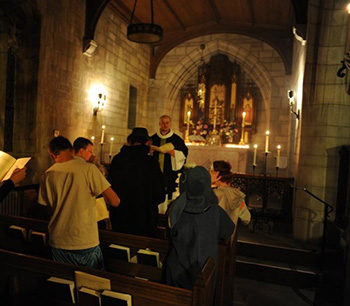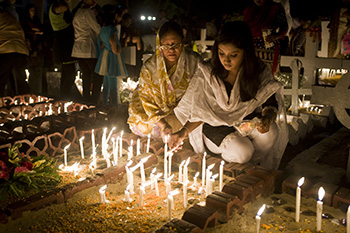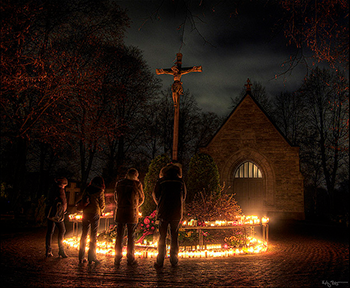From Our Archive
Edwina Gateley, "The Perseverance of the Saints" (2014); and Dr. Barbara Pitkin, "When a Picture is Worth a Thousand Words: Luther, Dürer, and the Living Word of God" (2011).
For Sunday November 5, 2023
All Saints
Lectionary Readings (Revised Common Lectionary, Year A)
Revelation 7:9-17
Psalm 34:1-10, 22
1 John 3:1-3
Matthew 5:1-12
This Week's Essay
Hallowtide is a triduum in the Christian calendar consisting of three days of vigil and remembering the dead. All Hallows Even (from which we derive “Hallowe’en”) is followed by All Hallows (or All Saints), and finally by All Souls. For many of us, our parishes will move these holy days to Sunday, where they will form a unified act of remembrance and prayer. But the distinctives of each day matter. Whereas All Hallows is an opportunity to pray for and commemorate the martyrs and saints of the faith, All Souls is when we pray for those who have died in our families or churches. It’s part of that incredible tapestry of faithful practice in which we confront death with the victory of the cross.
Honoring and remembering our dead is one of the central ways we grieve and process loss. We should not gloss over Hallowtide or downplay the opportunity it provides. There are those elsewhere in the world who do not have a choice in whether they get to practice their rituals of mourning and remembrance. As the war in Palestine escalates between Israel and Hamas, my heart aches at the stories of both Palestinians and Jews who are unable to properly honor their dead and mourn them.
For many Palestinian peoples, they prepare the deceased person for burial by bathing the body and covering it in a burial shroud, a profoundly intimate act. After the body is buried, they mourn for three days in which they express their grief in a prescribed manner that for men can include tossing soil upon one’s head or for women lamenting loudly. But the incessant Israeli bombardment of Gaza has forced most bodies to be disposed of quickly and the constant violence prohibits families time to mourn before the next rockets fall.
 |
|
The Vigil of All Hallows' being celebrated at St. George's Episcopal Church in Ardmore, PA on All Hallows Eve.
|
Nor is the situation much better for Israeli families. Many have not been able to even access their relative’s bodies, and even if they do manage a burial, they are unable to perform the traditional seven day grieving ritual, known as “sitting shiva.” They too are fleeing from rocket attacks, and many are being called up to serve in the Israeli Defense Force. For both Palestinians and Israelis, death is everywhere, and they have no respite to lean on their cultural and religious practices to face it.
As I’ve been praying for Palestinian and Israeli families suffering in this war, I’ve been reflecting on one of my most significant memorial experiences. I served during Operation Iraqi Freedom as an Army Chaplain’s assistant, and part of my responsibilities were planning and executing in-theater memorial services. Every soldier that dies receives a stateside memorial service, but we also perform a separate memorial in-theater (in the area of operations) to help ourselves process the loss and say goodbye. I often had to withhold my own grief as I planned the unit memorial service.
One of the most affecting moments in the service comes when the First Sergeant for the soldier’s company stands up and proceeds to take a roll call. They’ll call out the name of a soldier in the unit, who will stand up at their seat and yell, “Here First Sergeant!” Another name is called out, and again the response, “Here First Sergeant!” This continues for a few more calls and responses, before the First Sergeant calls out the name of the deceased soldier.
Silence.
Their name is called out again, and still there is silence.
Their name is called out for a third time, after which their First Sergeant sits down while the silence lingers.
It’s a haunting experience, but it punctuates the loss in such a tangible way. Never again will that soldier respond to the roll call that starts each day.
All Souls is a holy day for us to come together as a parish and give a roll call of all our dead from the past year. Even if they all received funeral services and burials, there is something marvelous about returning to their names, their faces, their memories, and seeing where our heart is healing or still struggling with commending them to God.
 |
|
Christians in Bangladesh lighting candles on the headstone of a relative.
|
One perplexity people sometimes have is why Hallowtide features both All Saints and All Souls. Aren’t the saints included in the remembered dead? Why do they need to have their own separate day? I suspect we each answer these questions in our own way, but here’s something that has really resonated with me over the years. All Saints is a time when we as a church can set our hearts and minds on the great cloud of witnesses who have gone before us in the faith, who have modeled for us that the Christian life really is possible.
I need this because I daily fail to be all that Christ has called me to be. Sometimes the Christian life seems too utopian, too difficult a task. All Hallows is a time for me to remember that the saints were folk just like me, ordinary people through whom God’s extraordinary grace worked miracles. That comfort renews my faith that perhaps God’s grace is sufficient for me too.
Just as I often lose faith in myself, sometimes it is also hard for me to maintain faith in the Church. When I look at the sins we Christians are responsible for, I can struggle to believe that the Church is a force for good in the world. A case in point lies at the roots of this horrible conflict that continues to rend the Holy Land. Whatever else we say about its multi-faceted causes, the existential fear that underwrites Israel’s recent scorched earth military response lies in centuries, even millennia, of antisemitism. One of the most pernicious of all racist ideologies, antisemitism has justified dozens of pogroms against the Jews, whether by deportation, assimilation, or genocide.
While there is some scholarly debate about exactly when and where antisemitism first emerged in history, there is no doubt that one of the oldest progenitors and promulgators of antisemitism is the Church. In the waning years of the Roman empire, and through the Middle Ages, various theologians and leaders of the Church concluded that God had thrown the Jews over in favor of the Church (utterly contrary to Paul’s letters to both Rome and Ephesus). This despicable attitude later infected Europe and was exported almost wholesale into Arab countries.
 |
|
Swedish Lutherans praying and lighting candles in front of the central crucifix of a graveyard.
|
When I think of the Church’s complicity in antisemitism and other sins, I need figures and faces who remind me that not all of Church history is like this. God is gracious, and there are people across time and space who reflect God’s continued transformative work in making all things new. All Saints is a time when we can repent and pray for the Church with all Christ’s faithful servants. Despite even our worst sins, God’s redeeming love is big enough to make the Church Christ’s very body in the world.
One last question I sometimes find myself asking is whether there are saints living today? What kind of characteristics do saints have, that I might know them when they pass me in the street? The words of Jesus in the Gospel reading for All Saints suggests a quite reliable guide to recognizing God’s saints in our midst.
Saints will be found among the poor in spirit, for theirs is the kingdom of heaven.
Saints will be found among those who mourn, for they will be comforted.
Saints will be found among the meek, for they will inherit the earth.
Saints will be found among those who hunger and thirst for righteousness, for they will be filled.
Saints will be found among the merciful, for they will receive mercy.
Saints will be found among the pure in heart, for they will see God.
Saints will be found among the peacemakers, for they will be called children of God.
Saints will be found among those who are persecuted for righteousness' sake, for theirs is the kingdom of heaven.
I close with a beloved prayer from the Book of Common Prayer (1979) that draws together all these themes. I invite all of us to pray this prayer throughout the coming week as we the Church commune with all souls and saints.
We give thanks to you, O Lord our God, for all your servants and witnesses of time past: for Abraham, the father of believers, and Sarah his wife; for Moses, the lawgiver, and Aaron, the priest; for Miriam and Joshua, Deborah and Gideon, and Samuel with Hannah his mother; for Isaiah and all the prophets; for Mary, the mother of our Lord; for Peter and Paul and all the apostles; for Mary and Martha, and Mary Magdalene; for Stephen, the first martyr, and all the martyrs and saints in every age and in every land. In your mercy, O Lord our God, give us, as you gave to them, the hope of salvation and the promise of eternal life; through Jesus Christ our Lord, the first-born of many from the dead. Amen. (BCP, p. 838)
Weekly Prayer
William How
For All the Saints (1864)
For all the saints who from their labor rest,
Who Thee by faith before the world confessed,
Thy name, O Jesus, be forever blessed,
Alleluia! Alleluia!O blest communion, fellowship divine.
We feebly struggle, they in glory shine;
Yet all are one in Thee, for all are Thine.
Alleluia! Alleluia!And when the fight is fierce, the warfare long,
Steals on the ear the distant triumph song,
And hearts are brave again, and arms are strong.
Alleluia! Alleluia.From earth's wide bounds, from ocean's farthest coast,
Through gates of pearl streams in the countless host,
Singing to Father, Son and Holy Ghost,
Alleluia! Alleluia!
Michael Fitzpatrick welcomes comments and questions via m.c.fitzpatrick@outlook.com
Image credits: (1) Wikimedia.org; (2) Wikimedia.org; and (3) Wikimedia.org.





